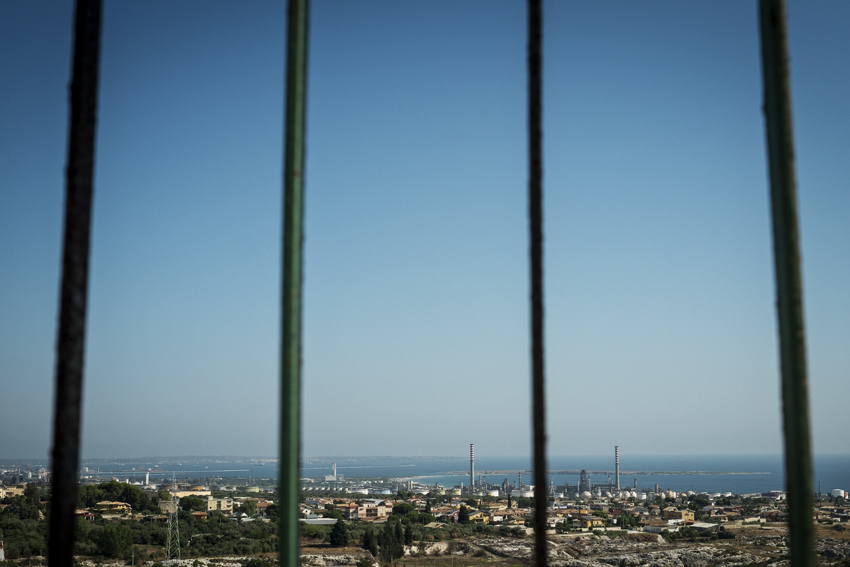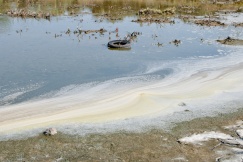
DEAD LAND
ITA / ENG
"A Carmelo Miano, che ci ha lasciato una notte di Novembre dopo una lunga battaglia"
Tra gli anni ’50 e ’70 il territorio a Nord della provincia di Siracusa viene totalmente modificato da quella che si prospetta una crescita economica e una possibilità occupazionale, che le campagne non garantivano più.
E' così che alla provincia di Siracusa spetta il primato della più grande zona industriale d'Europa, che si estende dalle porte di Siracusa fino ad Augusta, passando per Melilli e Priolo Gargallo, circa 30 km in lunghezza di costa occupati dall'industria pesante. Il sito include stabilimenti chimici, petrolchimici, raffinerie, un inceneritore per rifiuti speciali, discariche industriali e un’area portuale.
Gli anni sono passati e oggi piuttosto che di occupazione e benessere si fanno i conti con le conseguenze della presenza di questo immenso polo industriale e la crisi occupazionale che deriva dalla fermata di diversi impianti porta in alto le percentuali della disoccupazione, soprattutto giovanile.
Molti studi e perizie documentano la rovina ambientale e insieme la crisi sanitaria.
Nel 2000 l’area tra Siracusa e Augusta è stata dichiarata Sito di interesse nazionale per la bonifica (SIN), uno dei 48 siti industriali super-inquinati che si trovano sul territorio italiano. Sono 5.800 ettari gli ettari di terreno inquinato tra i comuni di Priolo, Melilli, Augusta e Siracusa e più di diecimila ettari in mare e coinvolge più di 180mila abitanti della provincia di Siracusa.
I dati ottenuti da uno studio sulla mortalità nel periodo 1995-2002 e i ricoveri ospedalieri nel periodo 2001-2007 tracciano un profilo dello stato di salute della popolazione interessata e destano una certa preoccupazione in quanto si evince che la mortalità per tumori presenta un numero di decessi significativamente superiore rispetto alla popolazione del resto della Sicilia.
Lo studio dimostra, dati alla mano, che la mortalità presenta innalzamento delle percentuali, tra gli uomini, per tumore maligno della trachea, bronchi e polmoni +24%, della pleura +428%, per le malattie psichiatriche +58% per le malattie cerebrovascolari +14%, e per le malattie respiratorie acute +132%. Mentre per le donne vanno segnalati il mieloma multiplo +120%, per le malattie del sistema nervoso +52%, per le malattie respiratorie acute +86%, per le malattie dell’apparato digerente +21% per la cirrosi epatica +32% e per gli avvelenamenti +24%.
Inoltre a questo si aggiunge la percentuale di nati malformati nell'ospedale civile ''Muscatello'' di Augusta in modo preoccupante superiore alla media nazionale e alla soglia di allarme indicata dall'Oms (Organizzazione Mondiale della Sanità).
Il polo industriale ha causato un elevato inquinamento ambientale nell’area. Nel sottosuolo sono state rilevate diossine e furani fino ad una profondità di 20-30 cm. Nell'atmosfera sono state riscontrare elevate concentrazioni di sostanze cancerogene e teratogene quali acrinotrile, benzolo, cadmio, cromo, nichel, silice, vanadio, diossine e furani.
La falda idrica si trova in uno stato di notevole degrado perché soggetta alle infiltrazioni delle numerose discariche abusive e non, disseminate nel territorio e un forte inquinamento da idrocarburi, causato da serbatoi di carburante privi del doppio fondo con effetti macroscopici quale la presenza di carburanti di varia natura nei pozzi comunali di Priolo (acqua per uso domestico) e Melilli (acqua per irrigazione).
Anche i fondali marini, antistanti gli scarichi industriali, sono risultati contaminati. Uno studio della Dott.ssa Maria Nicotra, ha confermato come i fondali antistanti gli scarichi industriali siano stati altamente contaminati da metalli pesanti quali mercurio, con concentrazione 22 volte superiore il limite consentito, diossine, idrocarburi policiclici aromatici, policlorobifenili ed eternit.
“Soltanto quando l’ultimo albero sarà morto, e l’ultimo fiume sarà inquinato,e l’ultimo pesce sarà pescato,l’uomo capirà che non si può mangiare il denaro.”
Proverbio degli Indiani Cree
"A Carmelo Miano, che ci ha lasciato una notte di Novembre dopo una lunga battaglia"
Tra gli anni ’50 e ’70 il territorio a Nord della provincia di Siracusa viene totalmente modificato da quella che si prospetta una crescita economica e una possibilità occupazionale, che le campagne non garantivano più.
E' così che alla provincia di Siracusa spetta il primato della più grande zona industriale d'Europa, che si estende dalle porte di Siracusa fino ad Augusta, passando per Melilli e Priolo Gargallo, circa 30 km in lunghezza di costa occupati dall'industria pesante. Il sito include stabilimenti chimici, petrolchimici, raffinerie, un inceneritore per rifiuti speciali, discariche industriali e un’area portuale.
Gli anni sono passati e oggi piuttosto che di occupazione e benessere si fanno i conti con le conseguenze della presenza di questo immenso polo industriale e la crisi occupazionale che deriva dalla fermata di diversi impianti porta in alto le percentuali della disoccupazione, soprattutto giovanile.
Molti studi e perizie documentano la rovina ambientale e insieme la crisi sanitaria.
Nel 2000 l’area tra Siracusa e Augusta è stata dichiarata Sito di interesse nazionale per la bonifica (SIN), uno dei 48 siti industriali super-inquinati che si trovano sul territorio italiano. Sono 5.800 ettari gli ettari di terreno inquinato tra i comuni di Priolo, Melilli, Augusta e Siracusa e più di diecimila ettari in mare e coinvolge più di 180mila abitanti della provincia di Siracusa.
I dati ottenuti da uno studio sulla mortalità nel periodo 1995-2002 e i ricoveri ospedalieri nel periodo 2001-2007 tracciano un profilo dello stato di salute della popolazione interessata e destano una certa preoccupazione in quanto si evince che la mortalità per tumori presenta un numero di decessi significativamente superiore rispetto alla popolazione del resto della Sicilia.
Lo studio dimostra, dati alla mano, che la mortalità presenta innalzamento delle percentuali, tra gli uomini, per tumore maligno della trachea, bronchi e polmoni +24%, della pleura +428%, per le malattie psichiatriche +58% per le malattie cerebrovascolari +14%, e per le malattie respiratorie acute +132%. Mentre per le donne vanno segnalati il mieloma multiplo +120%, per le malattie del sistema nervoso +52%, per le malattie respiratorie acute +86%, per le malattie dell’apparato digerente +21% per la cirrosi epatica +32% e per gli avvelenamenti +24%.
Inoltre a questo si aggiunge la percentuale di nati malformati nell'ospedale civile ''Muscatello'' di Augusta in modo preoccupante superiore alla media nazionale e alla soglia di allarme indicata dall'Oms (Organizzazione Mondiale della Sanità).
Il polo industriale ha causato un elevato inquinamento ambientale nell’area. Nel sottosuolo sono state rilevate diossine e furani fino ad una profondità di 20-30 cm. Nell'atmosfera sono state riscontrare elevate concentrazioni di sostanze cancerogene e teratogene quali acrinotrile, benzolo, cadmio, cromo, nichel, silice, vanadio, diossine e furani.
La falda idrica si trova in uno stato di notevole degrado perché soggetta alle infiltrazioni delle numerose discariche abusive e non, disseminate nel territorio e un forte inquinamento da idrocarburi, causato da serbatoi di carburante privi del doppio fondo con effetti macroscopici quale la presenza di carburanti di varia natura nei pozzi comunali di Priolo (acqua per uso domestico) e Melilli (acqua per irrigazione).
Anche i fondali marini, antistanti gli scarichi industriali, sono risultati contaminati. Uno studio della Dott.ssa Maria Nicotra, ha confermato come i fondali antistanti gli scarichi industriali siano stati altamente contaminati da metalli pesanti quali mercurio, con concentrazione 22 volte superiore il limite consentito, diossine, idrocarburi policiclici aromatici, policlorobifenili ed eternit.
“Soltanto quando l’ultimo albero sarà morto, e l’ultimo fiume sarà inquinato,e l’ultimo pesce sarà pescato,l’uomo capirà che non si può mangiare il denaro.”
Proverbio degli Indiani Cree
moreDead_Land.pdf (3.53 MB)









